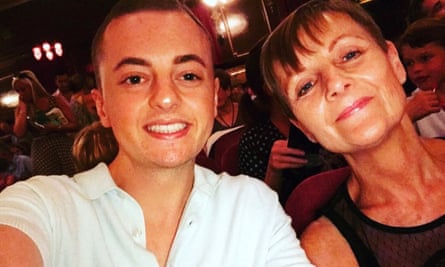
Jill Wright’s son, Harry, had song and dance in his bones. At 18 months old, he was dancing like the Spice Girls, copying the choreography from the TV. At seven, he won a talent contest and, at 16, a scholarship to the Urdang academy of performing arts in London. At 23, he was performing in The Book of Mormon in the West End when he was diagnosed with a brain tumour. Two years later, in 2019, Harry died. His death, and her grief, upturned Wright’s life.
This year, at 61, she staged a show written by Harry, at St Paul’s church, Covent Garden (commonly known as the Actors’ church), in his memory. After working for 40 years in the NHS, most recently as a speech and language therapist for children with special needs, she has switched careers to become a dresser for Les Misérables. “It was because of him that I had a change of heart and needed to move forward,” she says.
Wright made costumes for Harry throughout his childhood, but had always shrugged off his suggestions that she should be a West End dresser. “If you have a job that suits you, you don’t break the mould until something resets your mind. You just tinker on, doing what you’re doing.” But Harry’s death was followed by the pandemic and the universal and shared sense of grief that came with it. Wright found the space to reflect and prepare for change.
As Harry’s friends “continually reached out to offer kindness, I began to realise how much of a support the theatre community truly was”, Wright says. She felt a sense of belonging even before she changed career.
For months, she sent her CV to theatres and productions, to no avail. She did shifts after work or at weekends at the Actors’ church, where Harry rests. She still visits his memorial tree there – a magnolia – most days.
Finally, Wright heard of an opening for a dresser at Les Misérables. She had an interview and was standing in the queue for The Book of Mormon – “I had gone back to see it; I needed to put it to bed” – when an email arrived, offering her the job. “I thought: ‘OK, this is meant to be.’
“I get up every morning and I can face the day. I know that I am going into an amazing environment. It is exhilarating. When the lights go up and you hear the music start, nothing stops it. I never tire of it. I pinch myself every time I walk through the stage door.
“My job brings me so much happiness and the dressing room is my safe space. Harry used to talk about his dressers, and I know the importance of a good dresser, of what they do.” Wright dresses four performers. She prepares the costumes and steps in with a safety pin when a hem falls. “But you are also this emotional support,” she says. “It’s a special bond. My age means that I’m seen as a mother figure.”
Wright works on eight shows over a six-day week and leaves the theatre at about 10.45pm after an evening performance, before returning home to Chingford, east London. The hours have given her a new understanding of the demanding life Harry led.
When she worked for the NHS, she says, “we were like passing ships. He would come home at night, eat and go to bed late. I would come in from my job and there was all this washing up and the bedroom turned upside down. I can see now why he was doing this – because you do not have time to think. I have a newfound respect for what it was like to be in his shoes.”
Wright, who has two daughters, has experienced loss before. She was 22 when her first husband, whom she had married three years earlier, died suddenly from a brain haemorrhage. Her second marriage ended in divorce.
“Sometimes people say to me: ‘How do you still stand?’” she says. “Life’s events and circumstances can pave the way for a new future. Even in our darkest days, there is a light to be found. I guess we just have to make a point of looking for it. And also know that happiness and sadness can coexist in our daily lives.”
Tell us: has your life taken a new direction after the age of 60?



